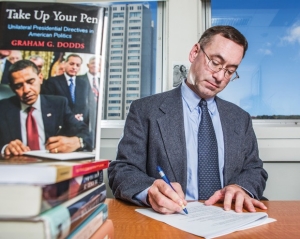Political pundits, Concordia professors among them, are now keenly watching what is becoming one of the hardest election outcomes to call. Will Trump be the next president of the United States and, if so, will the U.S. become the laughingstock of the world? Or are Americans ready to elect their first woman president, Democratic Party candidate Hillary Clinton?
Before one jumps to the conclusion that this presidential race, rife with lies, insults, childish slurs and contradictions, is unprecedented, it’s useful to go back in time, says Theresa Ventura, assistant professor in Concordia’s Department of History.
The Republican Party wasn’t always as far right as it is today. Indeed, until the 1960s the Democratic Party was the political home to white supremacists from Southern states, and maintained their power through disenfranchisement. That first began to change under President Franklin Roosevelt and his New Deal in the 1930s, which brought African-Americans and Catholic immi-grants into the Democratic Party fold. When President Lyndon Johnson, a Texas Democrat, signed the civil rights and voting rights acts in the mid-1960s, Republican Party operatives began courting Southern white conservative voters. Richard Nixon, president from 1968 to 1974, continued that strategy.
“The Republican Party has been since the 1970s and 1980s, up until today, this coalition between aggrieved white working-class voters, evangelical voters — who are not necessarily poor — and corporate interests, and Trump is just blowing that up,” says Ventura, who is originally from New York State. “So as unprecedented as his ignorance is, this strategy of really running on racial resentments, which he’s done masterfully, is old. And that’s not original to him at all.”



 Journalism professor Linda Kay feels that the coarse tone of the campaign has encouraged some media commentators to use a different set of rules for Hillary Clinton than for Donald Trump.
Journalism professor Linda Kay feels that the coarse tone of the campaign has encouraged some media commentators to use a different set of rules for Hillary Clinton than for Donald Trump.
 Political science professor Graham Dodds sees Hillary Clinton emerging as the next U.S. president, but should Donald Trump prevail, his negative views on NAFTA could have a devastating impact on Canadians.
Political science professor Graham Dodds sees Hillary Clinton emerging as the next U.S. president, but should Donald Trump prevail, his negative views on NAFTA could have a devastating impact on Canadians.
 Greg Nielsen, co-director of Concordia’s Centre for Broadcasting and Journalism Studies, would like to see the media challenge Donald Trump’s outrageous assertions.
Greg Nielsen, co-director of Concordia’s Centre for Broadcasting and Journalism Studies, would like to see the media challenge Donald Trump’s outrageous assertions.
 History professor Theresa Ventura points out that Donald Trump’s allure for white males reflects a change in the Republican Party strategy that began in the 1960s.
History professor Theresa Ventura points out that Donald Trump’s allure for white males reflects a change in the Republican Party strategy that began in the 1960s.
 Finance professor Arvind Jain sees Donald Trump exploiting fear already present in some American voters.
Finance professor Arvind Jain sees Donald Trump exploiting fear already present in some American voters.